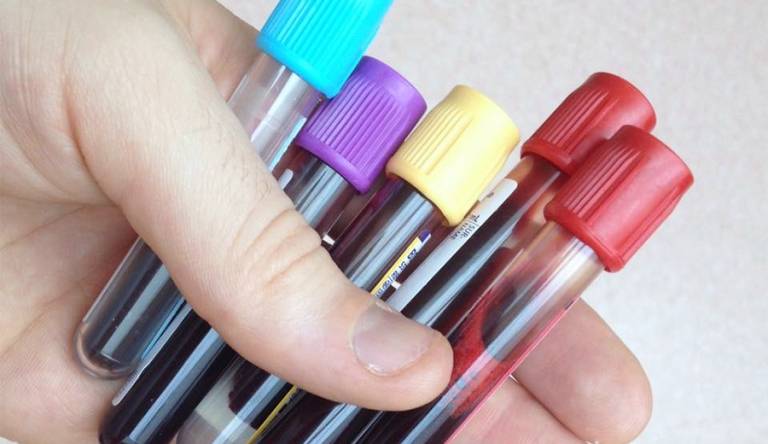Three in four British adults want cancer screening: new attitudes survey
21 September 2021
Cancer is seen as the top health concern among non-infectious diseases, according to a report by UCL academics finding that most British adults will want blood tests for cancer once they are available.

The report reveals high public demand for innovative diagnostic technologies such as single blood tests for multiple forms of cancer and access to optimally effective cancer treatments. The priority given to better cancer care links to the fact that 40% of adults say their lives have been changed because people important to them have been harmed by cancer.
The researchers also estimate that despite the efforts of the NHS to maintain cancer services in 2020-21, in the order of 10,000 people will die of cancer substantially earlier than would have been the case had Covid-19 not impacted the UK.
The report presents the results of the second UCL School of Pharmacy Cancer Policy Project survey on British public attitudes towards cancer research and treatment. In May 2021, 2,096 UK adults were surveyed by the research consultancy Yonder on behalf of the UCL academics, for a study sample that was weighted to be representative of the overall population.
The researchers found that three out of four (75%) people say, when single blood tests for multiple forms of cancer become available, they will want to be regularly tested. The quarter of adults who are hesitant about accepting cancer testing tend to be relatively young and members of ethnic minorities. The researchers found that these people are also more likely than others to say they are hesitant about accepting NHS recommended vaccines and to say that climate change is not a threat to human survival.
Over a third (36%) of adults think that if they or members of their families develop cancer the NHS care available will be world-class. A further 40% believe their NHS care will be as good as that anywhere else after their cancer has been diagnosed. 24% of the population think their NHS cancer treatment would be suboptimal, including a small minority – 5% of the total – who say they fear it would be poor. Almost nine out of 10 (86%) think that people aged over 70 have as much right to effective cancer treatments as anyone else.
Report co-author Professor David Taylor (UCL School of Pharmacy) said: “Since early 2020 most people have been primarily focused on the threat of Covid-19. But as the pandemic becomes better controlled by vaccines, medicines and other public health measures, cancer is re-emerging as the UK public’s top health priority. The immediate challenge is to reduce NHS waiting lists. Yet to retain British public confidence up to the next general election policy makers will also need to restore progress in cancer research, prevention and medical and social care improvement, despite the economic impacts of Brexit and Covid-19.”
Key policy opportunities proposed by the report authors include:
- Bringing forward funded plans for investing in well-equipped and staffed Community Diagnostic Hubs (CDHs). Located outside hospitals, CDHs are urgently needed to achieve or surpass the target of diagnosing 75% of all cancers at stages 1 and 2 by 2028 and improve disease identification in other fields. Earlier cancer detection allows more curative treatment. Additional investment in services such as targeted screening for lung cancer (which still accounts for 20% of all cancer deaths across the UK) is also needed.
- Identifying ways of further reducing tobacco smoking, with the goal of eliminating the habit by the start of the 2030s. British public support for stronger action on smoking prevention is deeper and more consistent than support for public health programmes on obesity, even though over one cancer in every 20 in the UK is caused by being overweight. In England a new tobacco strategy is expected to be published in late 2021.
- Strengthening NHS users’ rights to personally optimised cancer treatment. As more varied and complex cancer treatments become available maintaining public confidence will require enhanced ways of recording when NHS clinicians have been prevented from optimising individuals’ cancer treatments because of inadequate resources or other restraints.
- GPs currently refer NHS patients for urgent tests only when there is a 3% or greater chance of their symptoms being indicative of cancer. The report authors argue this threshold should be cut to 2% and eventually to 1%. They also recommend that while the UK brings Covid-19 under better control a critical review of the value of health economics in NHS decision-making ought to be undertaken, together with an evaluation of the successes and failures of cancer service planning in the UK since the 1990s. This could open the way to the publication of revised cancer strategies for England and the other UK nations for 2025-35. (A new Northern Irish strategy is currently out for consultation.)
Co-author and cancer clinician Professor Mark Emberton (Dean, UCL Faculty of Medical Sciences) concluded: “I strongly support the efforts being made to re-awaken public awareness of the value of early cancer diagnosis and to encourage people to report unusual symptoms to their doctors, even if they seem minor. But there is only so much this can achieve without more investment in better diagnostic services and optimal access to effective new treatments for all stages of cancer. Our research should remind politicians that the UK public wants the NHS to be a global leader in cancer care.”
Links
- Published report, ‘British Public Attitudes towards Cancer Research and Treatment 2021’
- Professor David Taylor’s academic profile
- Professor Mark Emberton’s academic profile
- UCL School of Pharmacy
- UCL Faculty of Medical Sciences
Image
- Blood samples. Credit: Tom Mallinson on Wikimedia Commons (CC BY 3.0)
Media contact
Chris Lane
Tel: +44 (0)20 7679 9222
Email: chris.lane [at] ucl.ac.uk
 Close
Close

